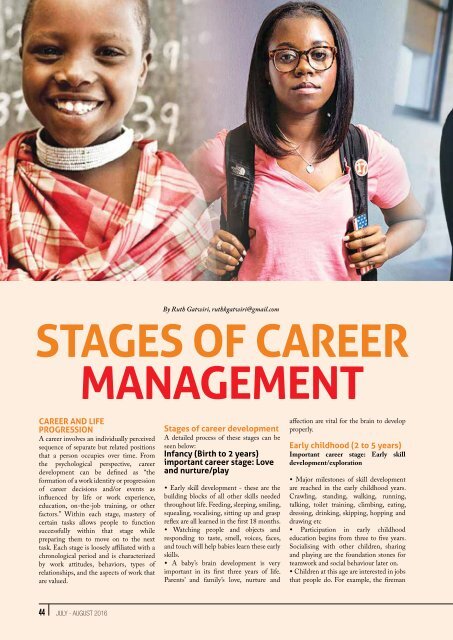The-Accountant-Jul-Aug-2016
You also want an ePaper? Increase the reach of your titles
YUMPU automatically turns print PDFs into web optimized ePapers that Google loves.
By Ruth Gatwiri, ruthkgatwiri@gmail.com<br />
STAGES OF CAREER<br />
MANAGEMENT<br />
CAREER AND LIFE<br />
PROGRESSION<br />
A career involves an individually perceived<br />
sequence of separate but related positions<br />
that a person occupies over time. From<br />
the psychological perspective, career<br />
development can be defined as “the<br />
formation of a work identity or progression<br />
of career decisions and/or events as<br />
influenced by life or work experience,<br />
education, on-the-job training, or other<br />
factors.” Within each stage, mastery of<br />
certain tasks allows people to function<br />
successfully within that stage while<br />
preparing them to move on to the next<br />
task. Each stage is loosely affiliated with a<br />
chronological period and is characterized<br />
by work attitudes, behaviors, types of<br />
relationships, and the aspects of work that<br />
are valued.<br />
Stages of career development<br />
A detailed process of these stages can be<br />
seen below:<br />
Infancy (Birth to 2 years)<br />
important career stage: Love<br />
and nurture/play<br />
• Early skill development - these are the<br />
building blocks of all other skills needed<br />
throughout life. Feeding, sleeping, smiling,<br />
squealing, vocalising, sitting up and grasp<br />
reflex are all learned in the first 18 months.<br />
• Watching people and objects and<br />
responding to taste, smell, voices, faces,<br />
and touch will help babies learn these early<br />
skills.<br />
• A baby’s brain development is very<br />
important in its first three years of life.<br />
Parents’ and family’s love, nurture and<br />
affection are vital for the brain to develop<br />
properly.<br />
Early childhood (2 to 5 years)<br />
Important career stage: Early skill<br />
development/exploration<br />
• Major milestones of skill development<br />
are reached in the early childhood years.<br />
Crawling, standing, walking, running,<br />
talking, toilet training, climbing, eating,<br />
dressing, drinking, skipping, hopping and<br />
drawing etc<br />
• Participation in early childhood<br />
education begins from three to five years.<br />
Socialising with other children, sharing<br />
and playing are the foundation stones for<br />
teamwork and social behaviour later on.<br />
• Children at this age are interested in jobs<br />
that people do. For example, the fireman<br />
44 JULY - AUGUST <strong>2016</strong>

















